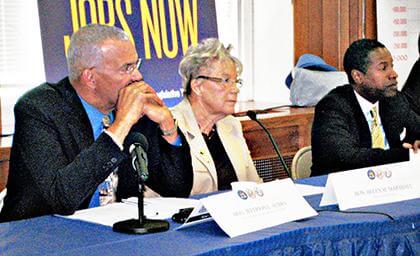By Ivan Pereira
With unemployment still high in New York City, elected officials in the borough said corporations and nonprofits must come up with new ways to get displaced workers back on their feet and working again.
On Friday, several organizations answered that call at a special meeting at Borough Hall and circulated several ideas on how to improve not only hiring but workers’ skills.
State Sen. Malcolm Smith (D-St. Albans) organized the first of five meetings in every borough to examine the state of jobs in the city and was joined by several elected officials, including Borough President Helen Marshall, state Assemblywoman Audrey Pheffer (D-Rockaway Beach) and state Assemblyman Jeffrion Aubry (D-Corona).
Many of the groups that made presentations during the meeting, such as the Queens Chamber of Commerce, told the panel the city and state governments could do a lot to help New Yorkers find employment and it was crucial that they lend a helping hand.
“Queens and the city are at a crucial part of the economy with retaining jobs,” said QCC Executive Director Jack Friedman.
Based on the latest numbers from the state Department of Labor, New York City’s unemployment rate is at 10 percent — 1.5 percent greater than during the same time last year.
Business groups said it has become increasingly difficult to do business in New York City because of numerous taxes levied upon small and large businesses. Friedman suggested Albany could provide relief by expanding the New York State Empire Zone Program and industrial business zone programs that provide corporations with tax breaks and loans if they do business in specially selected areas of New York.
“Having industrial business zones with tax credits will not only retain jobs, it will create them,” the executive director said.
Some groups said displaced workers are having trouble finding new jobs and an emphasis on improving employment search services. Thomas Galante, chief executive officer of the Queens Public Library, said that due to $14.4 million in cuts to the library, it has had to slash programs to help teenagers and adults with finding jobs, such as computer training and résumé workshops.
Galante also noted thousands of displaced workers use the library’s Internet access to look for jobs since they are too poor to have Web access at home.
“We have a lot that can help the people of Queens, but we have to find a way to keep it open,” he said.
Aside from finding a job, employers said they have a problem with younger workers not being prepared for the ins and outs of working in an office. Jonathan E. Toppin, the manager of talent acquisition for JetBlue, said that despite having degrees, many of his new recruits just do not have the knowledge to work in a professional environment, such as wearing proper attire.
Pheffer suggested the city’s high schools could consider bringing back co-op programs where teens could work in office settings and get an early taste of working life.
Reach reporter Ivan Pereira by e-mail at ipereira@cnglocal.com or by phone at 718-260-4546.



































